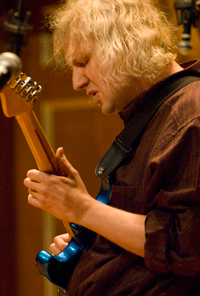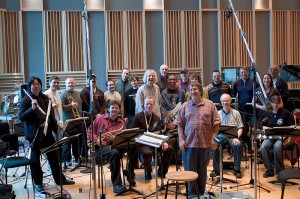Dance/Music Review: See Dave Lead — Jazz Composers Alliance Orchestra
You have to appreciate a guy who expressed his concern for both the drought on the Texas plains and the local arts community’s drought in terms of cancelled jazz programming on WGBH and the closing of The Boston Phoenix.
By Debra Cash
We take it for granted that conducting is, to coin a phrase, instrumental. The physical activity of leading an orchestra, any kind of orchestra, usually only comes to attention if the person at the podium is wildly enthused (think the hop-like-a-bunny Gustavo Dudamel), physically impaired (James Levine in a motorized wheelchair), or not what convention expected (the female Marin Alsop, the black Calvin Simmons).
These, of course, are just examples from the world of classical music. Jazz bandleaders are often out in front with baton or instrument at the ready, the first among equals, keeping things together, taking a turn. The exception is a bandleader like Cab Calloway, whom I managed to see in concert with his Cheshire Cat smile a few years before he died. But it’s unusual that a jazz bandleader specifically instructs the audience to pay attention to what it sees.
That’s why I made a point of checking out the Jazz Composers Alliance Orchestra‘s (JCAO’s) April 6 program at the Cambridge YMCA. Made up primarily of musicians who teach at places like Berklee and the New England Conservatory and well-known for its Julius Hemphill Composition Awards, the orchestra is celebrating its 25th anniversary (or 27 1/2th, depending on who you ask). It marked the occasion by inviting two local, contemporary dancers, Alli Ross and Lauren Simpson, to collaborate with trombonist/composer David Harris on a new work, “Big/small conduction for music and dance,” which follows the compositional technique of the late Butch Morris.
In full disclosure, I have known and been watching Ross for years, before and after she moved to New York with Sleep No More. Simpson was a student of mine at the Bates Dance Festival in Maine and has become a friend. I first met Harris when he was a member of the Klezmer Conservatory Band. Both the jazz and dance worlds are small, and those of us who stick out the struggle in Boston tend to cross paths.
“Big/small” is Harris’s first work composed with dance in mind, but, he explained, part of his ongoing approach to “ego-friendly” improvisation where the musicians don’t look at a score but instead interpret his hand movements. After establishing a funky, stride-walk percussion undertow, the musicians proceeded to follow the scribble of Harris’s hands with jabbers on woodwind values and blatts like malfunctioning car alarms. Ross and Simpson, dressed in yellow and aqua and dancing in sneakers, leaned into the frame of the tiny Y procenium, did some peekaboo with the black curtains, dove into deep kneebends, and responded to Harris’s cues, and the orchestra’s spontaneous responses, with popcorning spins. Every once in a while, a musician would turn his back to Harris and face the dancers directly for a little howd’ja-do.
There is a lot of talk about risk taking and playfulness in contemporary performance practice, but too often “experimental work” is shellacked with self-aggrandizement. It wasn’t clear how the JCAO musicians or the dancers were transitioning from episode to episode, and only a few moments that jelled in satisfying ways. But what was worth watching was every performer’s attentiveness and noticing how musicians who are not playing at a particular moment disappear aurally while the dancers holding still remain present. Harris says he hopes to experiment more in this vein, and I hope he does.

Pedal steel guitarist Norm Zocher — he put on a white hat for his “Boston wranglers” Texas swing-fusion number BRING ON THE RAIN.
I’d call Warren Senders‘ “On the Shoulders of Giants” “Isaac Newton visits Mumbai.” Senders was inspired by Isaac Newton’s famous quote “I do not know what I may appear to the world, but to myself I seem to have been only like a boy playing on the sea-shore, and diverting myself in now and then finding a smoother pebble or a prettier shell than ordinary, whilst the great ocean of truth lay all undiscovered before me.” Impressionistic, with layers of built-up rhythms under a Hiro Honshuku‘s tropical-sounding flute and Senders’s carnatic vocalisms, glittering motives appeared and were washed away in a blur.
Norm Zocher, who had been playing pedal steel through most of the concert’s proceedings, put on a white hat for his “Boston wranglers,” Texas swing-fusion number “Bring on the Rain.” With tunes that edged into Stephen Foster territory, JCAO gave the piece the big-band treatment with a saxophone choir throwing down a gooey caramel stream under Rebecca Shrimpton‘s nearly drowned out singing. On a program that seemed to follow the adage when in doubt, add more notes, Zocher’s overkill didn’t seem particularly out of place. You have to appreciate a guy who expressed his concern for both the drought on the Texas plains and the local arts community’s drought in terms of cancelled jazz programming on WGBH and the closing of the Phoenix. Bring on the rain, indeed.
c 2013 Debra Cash
Tagged: Alli Ross, David Harris, Jazz Composer Alliance Orchestra, Lauren Simpson, Norm Zocher, On the Shoulders of Giants




Thanks for this wonderful review, Debra!
One small correction: my vocalisms were/are Hindustani, not Carnatic.
Correction duly noted.